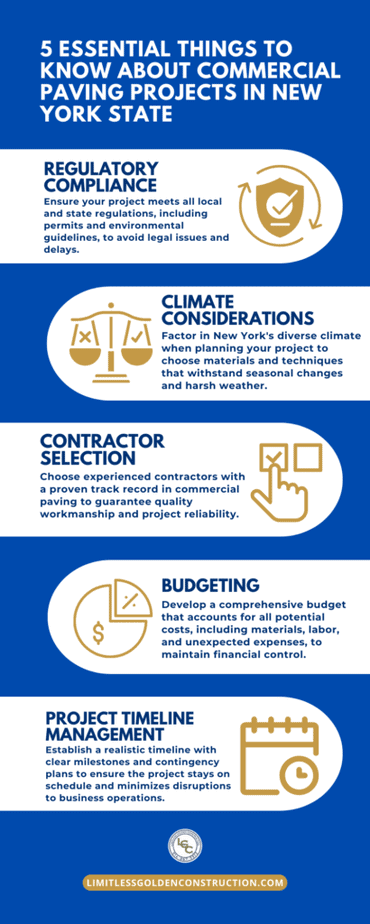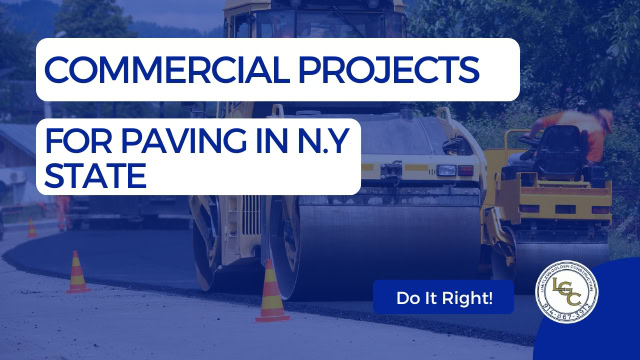Commercial projects for paving are crucial to the development and enhancement of business properties across New York State. Whether you’re a middle-class entrepreneur or a well-established executive, understanding the intricacies of commercial paving can significantly impact your project’s success. This comprehensive guide will walk you through everything you need to know about commercial paving projects, from planning and permits to execution and compliance, ensuring that your venture is both seamless and successful.

A Guide to Construction of Commercial Projects
Commercial construction projects require careful planning, expert execution, and adherence to state-specific regulations to achieve lasting results. You need permits, plans, actualization, engineer or architect and drawing explaining the changes that you’re making. Starting a commercial paving project starts with a strong framework of permits, plans, and professional expertise.
New York State mandates that any significant changes to commercial properties must be documented through detailed plans and drawings. These documents must be prepared by qualified professionals, such as engineers or architects, who can accurately illustrate the modifications you’re proposing. Having these experts involved from the outset ensures that your plans are feasible, compliant, and ready for approval.
The City Wants an Architect to Do Your Commercial Project’s Plan
In most cases, New York State cities require that an architect handles the planning phase of your commercial paving project. Architects not only design aesthetic and functional plans but also consider structural integrity and compliance with local regulations. Their expertise is crucial in navigating the complexities of commercial construction and ensuring that all aspects of the project align with city requirements. By engaging an architect early, you streamline the approval process and lay a solid foundation for your project.
Understanding the Essentials: From Planning to Completion
Commercial projects demand a careful and holistic approach, from the initial planning stages to final completion. It’s essential to understand the key elements of commercial paving projects to ensure that your venture runs smoothly and successfully.
Commercial Projects vs. Residential Construction: Key Differences and Complexities
Commercial construction projects, including paving, differ significantly from residential builds. The scale, scope, and regulatory requirements are more complex. Commercial projects often involve larger budgets, extended timelines, and stringent compliance standards. Additionally, the impact on the surrounding community and infrastructure is more significant, requiring thorough planning and coordination. Understanding these differences helps in setting realistic expectations and preparing for the unique challenges of commercial paving.
Construction for Commercial Projects: An Overview of Project Types and Processes
Commercial construction encompasses a variety of project types, each with distinct processes and requirements. From retail spaces and office buildings to industrial facilities and public infrastructure, commercial paving projects can vary widely. The common thread across all these projects is the need for meticulous planning, expert execution, and ongoing management. Familiarizing yourself with the typical stages of a commercial project—from initial design to final inspection—ensures that you’re well-prepared for each phase of your paving venture.
Commercial Project Management: Ensuring Efficiency and Success in Your Build
Effective project management is the backbone of successful commercial paving projects. A dedicated project manager coordinates all aspects of the build, ensuring that timelines are met, budgets are adhered to, and quality standards are maintained. They act as the central point of communication between the owner, contractors, and regulatory bodies. By overseeing the day-to-day operations and addressing any issues promptly, project managers play a critical role in steering the project to successful completion.
Contact us for a free quote and assistance with your commercial paving project in New York State. Our team of experts has the knowledge and experience to guide you through the process, from planning to execution, ensuring that your project is delivered on time, on budget, and above expectations. Let us help make your commercial paving vision a reality. Remember, proper planning leads to successful projects! So don’t hesitate to reach out for professional guidance and support in your next commercial paving venture.

Property Rules: Understanding Zoning Laws and Building Codes for Commercial Projects
New York State has a comprehensive set of zoning laws and building codes that govern commercial construction projects. Zoning laws determine how property can be used, while building codes set the standards for construction quality and safety. Understanding these regulations is crucial for ensuring that your paving project complies with all legal requirements. Failure to adhere to these rules can result in costly delays and penalties, so it’s essential to work closely with professionals who are familiar with local laws.
Role Property Management: Partnering with Property Managers for Existing Structures
For commercial projects involving existing structures, partnering with experienced property managers can be highly beneficial. Property managers bring valuable insights into the maintenance and operational aspects of commercial properties. Their expertise can help you integrate new paving work seamlessly with existing infrastructure, ensuring that the overall functionality and aesthetic appeal of the property are enhanced. While this section is brief, it highlights the relevance of property management in certain commercial projects.
Learn more specific information about regulations and laws with us, we’re here to help you.
Do I Need an Architect? Understanding When Architectural Expertise is Essential
The role of an architect is indispensable in many commercial paving projects. Architects bring a blend of creative design and technical knowledge, ensuring that your plans are not only visually appealing but also structurally sound. They can help you navigate complex regulatory requirements and create designs that maximize the utility and aesthetic value of your property. If your project involves significant alterations or new construction, having an architect on board is crucial for achieving your vision.
Difference Between Architect and Engineer: Their Roles in Commercial Projects Construction
While both architects and engineers play vital roles in commercial construction, their responsibilities differ significantly.
Architects focus on the design, aesthetics, and functionality of the project, while engineers ensure that the structures are safe, durable, and compliant with technical standards. Engineers handle the practical aspects of construction, such as load-bearing capacities, materials, and environmental impact.
For commercial projects, having an architect is often a requirement. They provide detailed drawings and plans that illustrate the proposed changes, ensuring that every aspect of the project is clearly communicated and understood. For private properties with significant alterations, a detailed drawing or an engineer’s input may suffice. This distinction ensures that projects are appropriately planned and executed, minimizing the risk of errors and ensuring compliance with all regulations.
Developing Commercial Projects Budget and Timeline: Considering Permitting Timelines and Costs
Creating a realistic budget and timeline is essential for the success of your commercial paving project. Start by considering all potential costs, including permits, materials, labor, and contingency funds. Permitting timelines can vary, so it’s important to factor in the time required for approvals. Developing a comprehensive budget and timeline helps in managing expectations and ensuring that the project stays on track financially and temporally.
Additional Considerations: Contractors, Permits, and Inspections
At Limitless Golden Construction you can select the right contractors, it is critical for the quality and efficiency of your paving project. Our team of contractors have experience in commercial projects with good references and credentials. Securing the necessary permits is another vital step, as it ensures that your project complies with all legal requirements. Regular inspections throughout the build help in identifying and addressing issues promptly, ensuring that the project meets all quality and safety standards.

Communication and Decision-Making Throughout Commercial Projects
As the owner, your involvement, and decision-making play a key role in the success of your commercial project. Maintaining open lines of communication with your project team ensures that any issues are addressed promptly and that the project progresses smoothly. Selecting a qualified team, setting clear expectations, and staying informed about the project’s status helps in making informed decisions. Your proactive engagement can significantly impact the efficiency and outcome of your commercial paving venture.
For those looking to explore further or seeking professional guidance, consider reaching out to experienced architects, engineers, and project managers who can provide tailored advice and support for your specific needs. Your commercial paving project is not just about laying asphalt; it’s about paving the way for your business’s growth and success. Do it right, trust the pros and schedule now if you are about to do any paving project and need help knowing exactly what you have to do or should know before.


